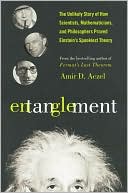Ye Olde Natural Philosophy Discussion Group
Reviews and comments on
Amir D. Aczel:
Entanglement: The Unlikely Story of How Scientists,
Mathematicians, and Philosophers Proved
Einstein’s Spookiest Theory [2001]

Our group was somewhat split in its evaluation of this book. Most people liked it, but there were a couple of nay-sayers who gave it a low rating. Our group average was 5.8 on a scale of 0 to 10.
Rich missed the meeting, but sent in his email review:
I liked the book. I’ve read many books on quantum mechanics and there’s always much I don’t understand. In this book I liked the mini biographies of the major quantum players. He also did a good job of telling quantum history in an interesting fashion. His description of entanglement was the best I’ve read. He included drawings of experiment setups and I found that helpful. I’m still bothered by entanglement. It reminds me of gravity in the 17th century. There was an equation to describe the force of gravity and everyone knew it existed but didn’t understand why. I want to understand why entanglement works like it does. Despite that, since I advanced my understanding of the subject and enjoyed the book overall I give it an 8.
Kevin had a split attitude on the book. He agreed with Rich about the good short biographies. But with regard to Aczel’s attempt to explain entanglement “I don’t believe he hit the ball out of the park.” Bell’s argument is still not clear. Kevin agreed that the experiment diagrams were helpful, and overall he thought the book was well written and pretty clear. He rated it a 7.
Ron, however, rated it at just 4 on our scale. He thought Rich and Kevin were too generous! Ron felt that as far as explaining entanglement goes, “the book sucks!” He added that there was way too much repetition, and that the equations given really didn’t mean anything to the reader. Ron also felt the bios really didn’t add much to the book and should have been cut out. Ron objected to the frequent reference to “magical” results in quantum mechanics, and noted that in reality there is nothing “magical” in physics, even figuratively. He didn’t think the book was very well written, and thought—for one thing—that it would have been better if it were organized more chronologically, instead of jumping around. The diagrams were nice, but the text should have explained more adequately what was going on in the various experiments, or in other words how to more fully understand those diagrams.
Rosie, though, disagreed with Ron. She liked the book and gave it an 8. She thought some of the repetition was useful. “This book helped me get a much clearer idea of entanglement.” Her only real complaint is that on occasion Aczel’s use of the pronouns “he” or “him” did not make it completely clear who he was referring to. Rosie said that from page 229 on, in the section on the GHZ experiment proving Bell’s Theorem, things got hard to follow. But overall she really liked the book a lot and was impressed that the author was able to write a book on this hard topic for non-scientists.
Scott didn’t think much of the book. In fact he had to force himself to read it. At the meeting he gave it a 4. But in light of some additional reading suggested later by Rosie (see below), he lowered his final rating to just a 2. In Scott’s view, the constant problem with quantum mechanics is not what actually happens in one experiment or another, but how to interpret what happens from a philosophical point of view. There is a long history of disputes about how to do this, including as a major part of the long debate between Einstein and Niels Bohr, Werner Heisenberg and their allies. But Scott felt that Aczel simply assumed that the Bohr-Heisenberg “Copenhagen Intepretation” was correct, and didn’t really even consider alternative, more materialist, interpretations. In particular, although John Bell and David Bohm were frequently referred to in the book, hardly any mention was made of their interpretation of what was going on in the experiments mentioned. In short, the book is strongly biased in an idealist philosophical direction.
John agreed with some of the things that everyone else had said. He didn't feel he understood quantum mechanics any better than he had before he read Aczel's book, and that it didn't further his knowledge that much. But he did enjoy the book, and gave it a rating of 6.
After our meeting Rosie did some further investigation about the Bohm interpretation of quantum mechanics, and found quite a good presentation of this more materialist and determinist view at these two links: http://plato.stanford.edu/entries/qm-bohm/ and http://plato.stanford.edu/entries/determinism-causal/#QuaMec. The material there reinforced Scott’s view that Aczel’s book was very one-sided philosophically (and worse yet, one-sided on the wrong side!), which led him to lower his rating for the book to just 2.